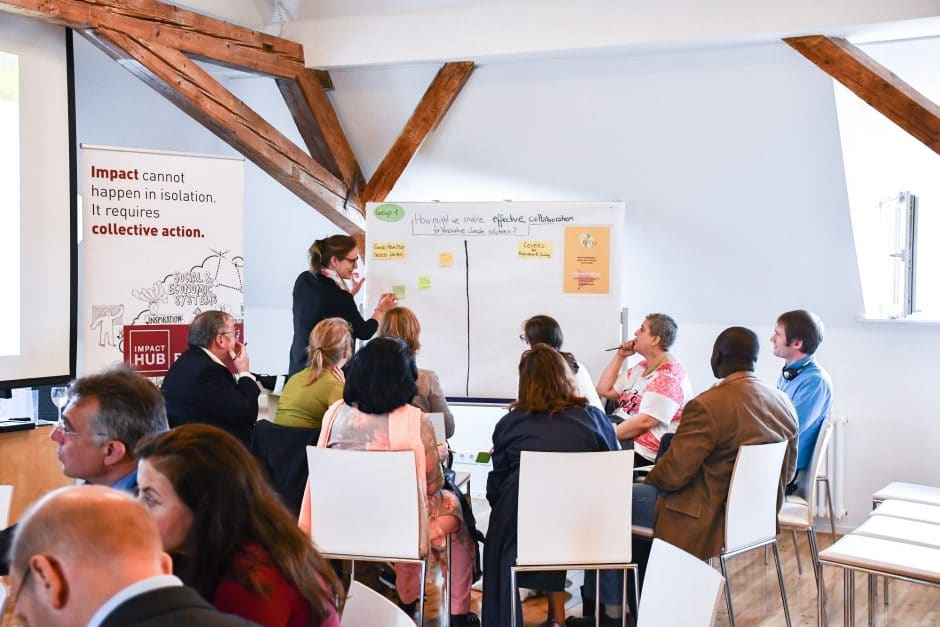Collaboration is hard!

Four months ahead of the UN Secretary-General’s Climate Action Summit, the International Conference on Climate Action – ICCA2019 – brought together 1,000 leaders and decision-makers from countries, regions and cities as well as stakeholders and experts from around the world, in Heidelberg, Germany. One of the big messages: Collaboration is hard, and is the core of impactful climate action.
“Coming together is a beginning, staying together is progress, and working together is success.” This famous quote attributed to Henry Ford (1863-1947) and Edward Everett Hale (1822-1909) remains as relevant as ever in the context of climate action.
Coming together is a beginning (at ICCA 2019)
Impact Hub Berlin and Climate KIC have invited climate pioneers and winners of the Better Together Award 2019, an international competition seeking collaborative innovations solving local climate challenges, to meet with participants of ICCA and members of the Climate KIC community. Together they wanted to know How might we enable effective collaboration for innovative climate solutions?
Staying together is progress
It’s not common to get a room full of people from start-ups, corporates, NGOs, cities, politics, research and public bodies to actually talk to each other. All work at different speeds and different operating models. All have different motivations and terminologies. One of the participants is Paulo Francisco, representing the City of Lisbon. He’s kicking off a small hands-on discussion using the City Finance Lab as an example for successful collaboration, Europe’s first dedicated platform supporting the development of innovative financial solutions that increase investment in low-carbon and sustainable urban projects. His group quickly developed a set of recommendations during the session. In just seconds the discussion unravelled the complexity of the effective collaboration for climate solution and gravitates around the topics ‘end users’ (people must see the outcome – climate action – as convenient, socially and economically) and communication. It’s a group of unlikely allies that comes together here – something that we should see more often. “Getting feedback from lots of sectors is very relevant to us. Getting new perspectives from NGOs and start-ups is brilliant. Climate action truly needs this kind of exchange.” says Francisco.
Working together is success
This last part of the famous quote is something that we have to give far greater prominence to in climate action: celebrate the fact that people, organisations, companies can get over their barriers, sync their speeds and adapt their modes to work together for a collective outcome. It’s stories like that one from Kevin Houston, co-founder of Carbonlites: he prototyped a biogas and biofertiliser producing station for a temple in Bangalore, installing it in a refurbished shipping container. It’s carbon mitigation in a box – by not sending organic waste to landfills, it avoids methane emissions. The citizen-led ‘Residents Welfare Association’ spotted this solution and facilitated a long process that established a working partnership with the municipality. Now, this station prevents the emission of 5 tons of methane and 1.2 tons of CO₂ daily, while producing 400 kg of biogas and 1 tonne of fertiliser, and cleaning up the borough. “We are now executing that project. It would not have happened without the collaboration at the citizen level”, says Houston.
Or stories like the one from MUV – a mobile app that tracks its users’ daily routes and assigns points for sustainable behaviours across 31 indicators, encouraging them to participate in city-wide challenges. MUV is the result of a collaboration between the municipality of Palermo and the social innovation lab PUSH, and both partners coordinate local activities such as co-creation workshops and design sessions with citizens and stakeholders. During the testing phase in Palermo, Italy, the first 2000 users reduced their carbon footprint by an average of 54 per cent. “Gamification and challenges with other citizens can truly scale up climate action,” says Svea Heinemann, cities expert at Climate KIC.
And sometimes the hero of a collaboration success is simply an excellent software, like XDI.Sydney, that enabled the Australian New South Wales Office of Environment and Heritage to combine different datasets from various agencies and power, water and communication services – even convincing competitors – for a new level of climate models and future climate risk mapping (and yes, the software will be launched in Europe, too).
None of these examples were an easy ride. All of them had to overcome incredible barriers. Therefore, let’s celebrate collaboration. It’s hard, but it’s the core of implementing effective climate solutions. And what’s innovation without implementation? Not climate action.
The International Conference on Climate Action in Heidelberg was held on 22 and 23 May 2019 and hosted by the Federal Ministry for the Environment, Nature Conservation and Nuclear Safety together with the Federal State of Baden-Württemberg and the City of Heidelberg.
